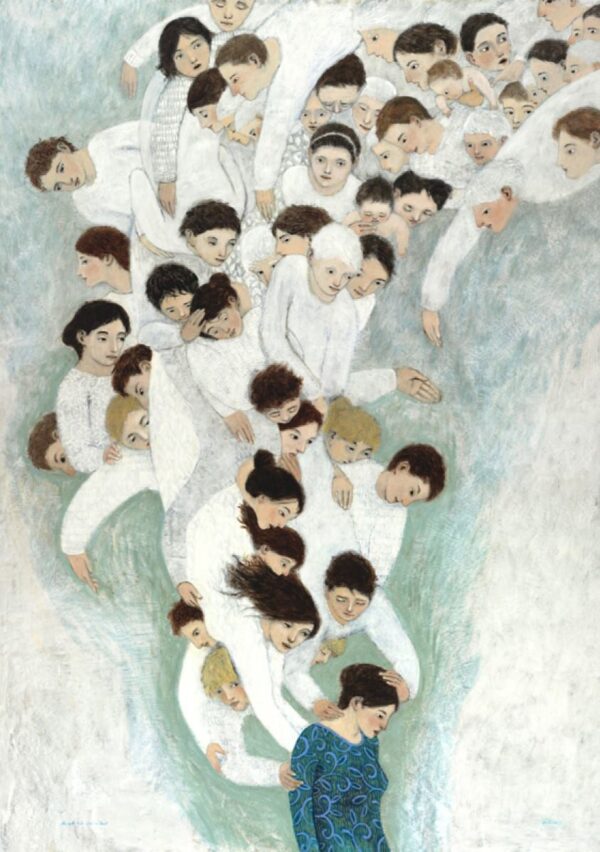How Christians’ fixation on Jesus gives a new meaning and richness to the Christmas season.
On a Saturday morning in January, 2004, the howling Chinook wind of the previous day gave way to a northerly breeze over Lethbridge, Alberta. The temperature dropped to -14°C. We walked across town to meet with George, and his wife Shelia (not her real name). George was an active member of the Church of Jesus Christ of Latter-day Saints, and Shelia served faithfully as the ward’s pianist.
She was also a staunch atheist.
Over brunch, we discussed religion with Shelia as George, in his usually reserved manner, spoke hardly a word. Shelia listened intently — but as is typical with deep conversations on philosophy or religion, there was no persuasion happening. Just understanding viewpoints.
I found the contrast in my beliefs, and hers, fascinating — which I reflected on for days afterward. As a man of faith, I am motivated to do what is right in part out of fear of punishment, and more so in recent years, by a growing love of Deity. Shelia, on the other hand, found meaning in service — without God.
I suppose we all start out life on the agnostic side — not knowing God, and not even knowing if there be any god at all. From that perspective there is only this life, and anything a person can do to maximize pleasure and happiness in this life, should be the only pursuits. I understand this perspective.
I wonder though if the irreligious can appreciate what it means to be a person of faith. Can they understand why I live this way? Or, can they ever find faith, for themselves?
Christians have puzzled many an atheist for their weird beliefs. They go to church on Sunday, sing and shout with the congregation, weep at spiritual stories, and pray to an unseen Being in the sky … And then get into trouble on Mondays. They teach a perfect standard which they themselves never seem to attain. And some vote for sinners like Trump.
And strangest of all is their absolute fixation on someone named Jesus — a historical figure from 2,000 years ago. He lived only a short life, and historical details of His life are scant. Yet there are between 2.3 and 2.6 billion people who call themselves after the name of Christ, and they celebrate His birthday for an entire month. You know, between Halloween and New Year’s Eve.
I speak secularly about this, so those of you who are believers, bear with me: from the perspectives of the non-believers, Christians are pretty weird!
If you are one of the world’s 5.4 billion non-Christians, Christianity may seem strange and totally unreasonable. I want to share my perspective on why we have faith, and specifically, why we place such a great importance, and have a fixation on Jesus Christ.
What Is Faith?
What is faith, and why do we want it? Faith is not necessarily to have a perfect knowledge of something. Some have criticized faith as a blind belief without evidence, which is incorrect. Instead think of faith as the act of seeking for knowledge.
This definition of faith can be appreciated by scientists who use the scientific method as a means of finding what is true. They seek for knowledge by finding evidence. They find evidence by experimenting on a hypothesis.
Many Christians view this experimenting as “an act of faith.” Although some have been confused on this concept, Christianity does not impose a requirement of blind faith among its adherents. Rather, it encourages followers to ask, to seek and to knock — until the door of knowledge is opened.
Many who might have sought faith, but became discouraged along the way, mark themselves as “atheists,” saying they know there is no God. Normally what they mean is they just don’t know if there is one or not — making them agnostic rather than atheist.
This is an important distinction, and one that puts atheists at a steep disadvantage. Believers say they know there is a God. Atheists say they know there isn’t. But in this claim they commit the same crime they accuse the believers of: knowing something without any evidence at all.
In order to know there isn’t a God, an atheist would, in my view, need to know the contents of the entire universe, in order to confirm there is no God in there. I would add that the possibility that there is no God in or out of a vastly large universe is, in my reasoning, improbable.
But that’s reason, not faith. Faith, in its most basic form, is an acknowledgement that there is a lot in this universe we just don’t know. That admission is what keeps minds open and drives the curiosity of every scientist and every seeker.
Faith first acknowledges the possibility. Then it drives a person to find the truth. Science, as witnessed by human eyes, will only get you so far. But the most important questions of life, such as what life is for, can only be witnessed by our spirits. More on this another day.
You may not have become a witness of God yourself, but when you run into a person of faith, be careful to not accuse her of having no evidence for her beliefs. You don’t know that. And one day you may find that she actually knew, because she diligently sought, and found.
When someone knows something important that you don’t know yet, this should be good cause for introspection. If it’s important you should seek and find the answer for yourself.

A Fixation on Jesus, as Savior
So it turns out that there is more to us than this life only. After we die our spirits continue on as intelligences. Our personalities, including our intelligence, knowledge and relationships, carry on. Even after death we will continue to learn and progress.
That means that it really did matter how we lived our lives. The wisdom we learned stays with us.
It also means that all the mistakes we made in life will have an eternal ripple effect, permanently damaging the trajectory or our progression. In fact, as with a ripple, every mistake and every setback has a permanent consequence. The penalty is eternal. Therefore we could never be perfect, or have perfect happiness. In living a brief, mortal life on Earth, all have become permanently soiled and ineligible for perfection.
Then there is Jesus.
Over thousands of years of history, there have been many good men and women who have done great work in lifting the human family. But among all these, one stands out.
Jesus, whose birth we celebrate each Christmas, was born sometime around 5 B.C. and lived only into His mid-30’s. He was born in humble circumstances, and grew in wisdom and stature much like the rest of us do. But because He lived rightly, His progression occurred at an astounding speed. This was evident when, at age 12, He was found sitting in the temple among the doctors, who were “astonished at his understanding and answers,” according to Luke.
During His brief ministry, Jesus gained many followers but also made many enemies, who later turned Him over to the Roman government to be crucified.
What Jesus’ purpose was, however, was to save His people from their sins. He did this during the Atonement — when He suffered in the Garden of Gethsemane, shortly before His crucifixion. There Jesus paid the eternal penalty of every sin, mistake, pain and sickness experienced by the human family. Every setback was paid for.
The account of this event is heavy, but one that both Christians and non-Christians should understand. Here is what Matthew, Mark and Luke wrote:
Then cometh Jesus with them unto a place called Gethsemane, and saith unto the disciples, Sit ye here, while I go and pray yonder.
And he taketh with him Peter and James and John, and began to be sore amazed, and to be very heavy;
Then saith he unto them, My soul is exceeding sorrowful, even unto death: tarry ye here, and watch with me.
And he went forward a little, and fell on the ground, and prayed that, if it were possible, the hour might pass from him.
And he said, Abba, Father, all things are possible unto thee; take away this cup from me: nevertheless not what I will, but what thou wilt.
And there appeared an angel unto him from heaven, strengthening him.
And being in an agony he prayed more earnestly: and his sweat was as it were great drops of blood falling down to the ground.
And when he rose up from prayer, and was come to his disciples, he found them sleeping for sorrow.
We do not fully understand the breadth and depth of the Savior’s suffering that night. But His intent was to suffer an infinite punishment, so that we would never have to know.
Now having paid that great penalty, Jesus offers something to each of us: to heal us of all of our setbacks — the sins, mistakes and sicknesses we have all fallen to. What does He ask of us in return? To repent of our sins by admitting our errors, turning them over to Him, and improving ourselves. He asks that we keep His commandments — which are to love God, and to love mankind. He asks us to live as perfectly as we can — and for all we cannot do, He will cover the rest. That is a good deal, indeed.
Come and See What We Mean
You may feel unworthy of the Savior’s help, as if you have gone too far down and are out of His reach, but the Savior has already paid for your setbacks.
You may be unwilling to turn over your mistakes to Jesus because you cherish the lessons and wisdom you learned from them. But you aren’t being asked to surrender the lessons you’ve learned: you are just allowing Jesus to clean up the mess.
You may not like the idea of being dependent on anybody. You might prefer paying your own way because you are a strong, independent person. You certainly have that right, and you certainly can pay on your own, but you do not know the extent of that payment. Why not take the Lord’s discount?
The deal is too good to pass up. But now that I’ve explained a little of the need for a Savior, we turn back to the original problem: you may still not even know if any of this is true. Why should a person have faith, and why should that faith be rooted in a fixation on Jesus? Is it worth pursuing the answer?
For anyone with regrets, for anyone who has experienced setbacks either through your fault or through the fault of others, the answer of Jesus’ divinity is definitely worth pursuing. Find a trusted friend of faith, or a missionary or a member of clergy, and they will show you how to find an answer for yourself.
Two-thousand years ago, a host of angels proclaimed good tidings of great joy to the shepherds outside of Bethlehem. That night, a Savior, which is Christ the Lord, was born into our world.
As did the shepherds, come and see Him. Come and experience His love. Come, and live like He did. Come, and be made clean again.
– by AJ Martel

Feature image caption: “Gethsemane,” by Adam Abram, depicts the Savior Jesus Christ as he atones for the sins of mankind.
AJ Martel – Escalante
AJ Martel is the youth coordinator at The Byway, but he is involved in most everything. He and his family live in Escalante, and they love it here! AJ has found Utah’s small towns quite inviting and under-defended, which is why he’s so involved with the paper. What AJ loves to do most, though, is serve his community. That is clear through everything he writes and does for Escalante, Utah.

